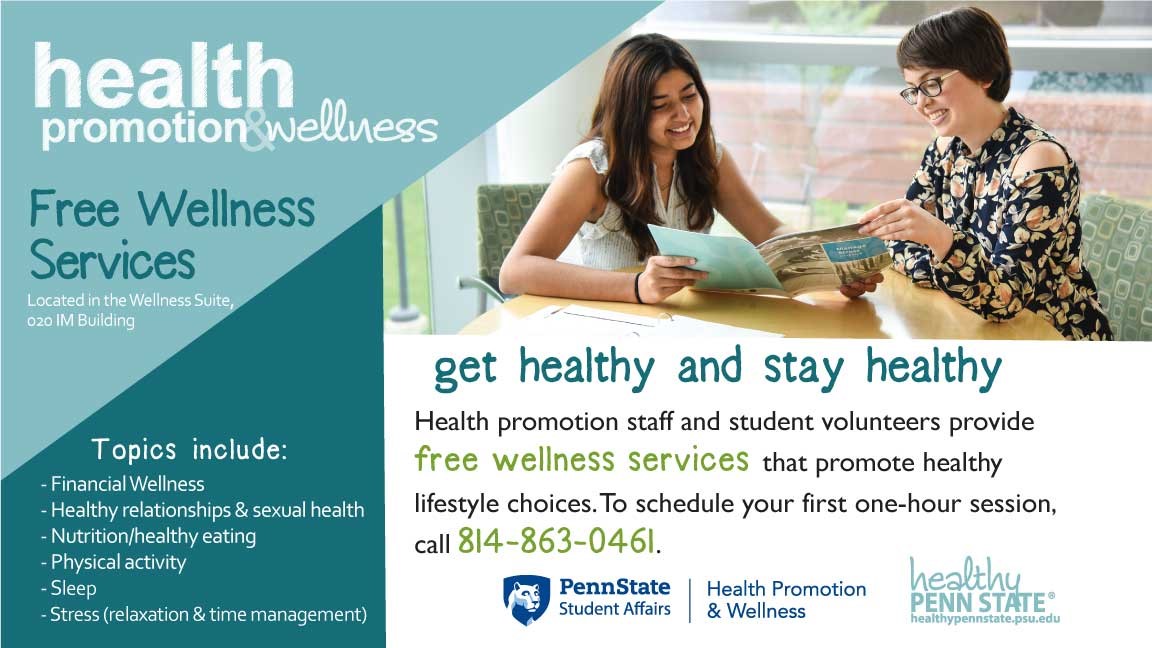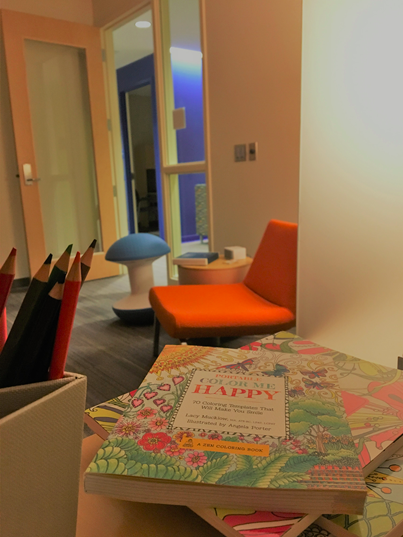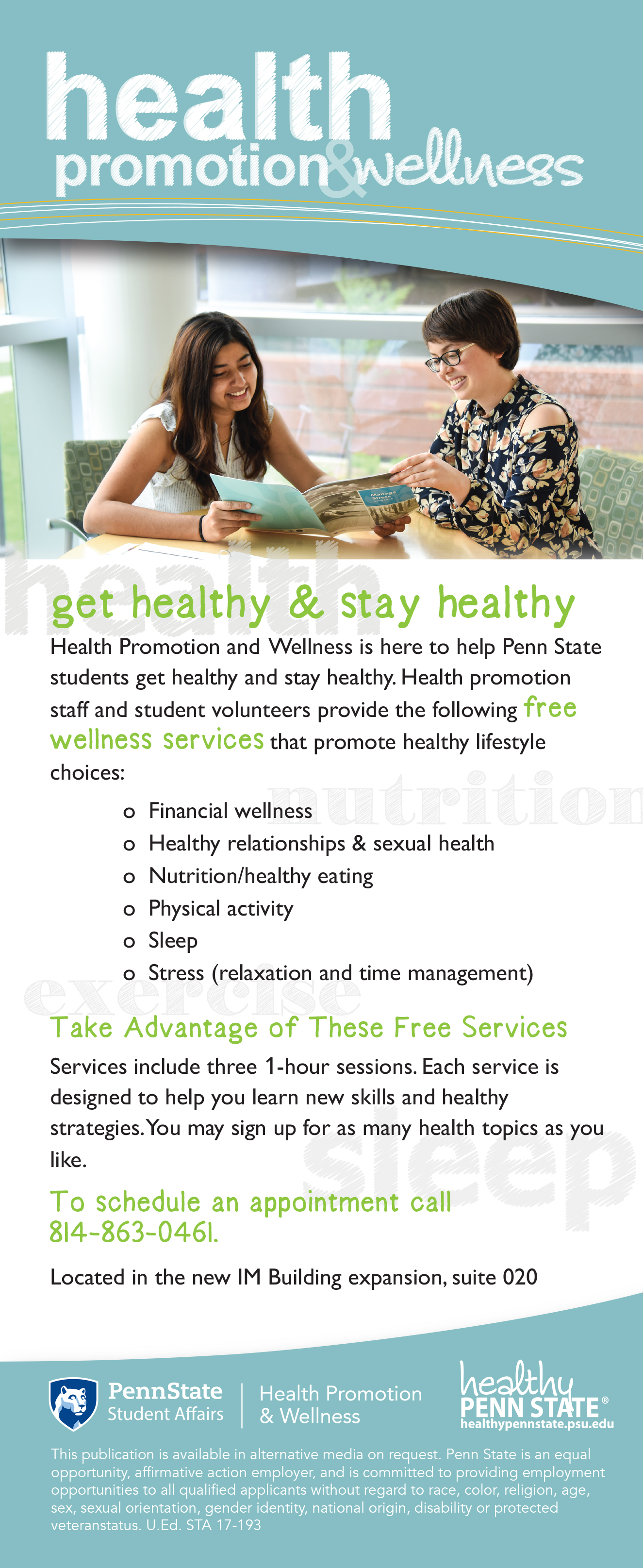Category Archives: Stress Management
Tips to Reduce Stress and Sleep Better
During finals week, most students would agree that their stress level increases, while the number of hours they spend sleeping decreases. This might sound like old news, but did you know that stress and sleep directly affect your overall health and wellness?
Increased stress can lead to decreased sleep, and both can lead to lower academic performance, more illness, weight gain, and increased mental health issues. One way to decrease stress and improve sleep is to incorporate relaxation into your daily routine. Research shows that practicing relaxation techniques may result in recovery from fatigue, better sleep quality, and an increased sense of control and efficacy in stressful situations. Relaxing includes taking a walk in the park, deep breathing exercises, meditation, or yoga. Try the free yoga classes at the Student Health Center from 4-5pm on Wednesdays and Thursdays all fall semester and through finals week.
In addition to stress, sleep can be affected by the blue light that is emitted from electronic screens. Blue light delays the release of sleep-inducing melatonin, increases alertness, and interrupts your circadian rhythm. Normally, the pineal gland in the brain begins to release melatonin a couple of hours before bedtime, and melatonin reaches its peak in the middle of the night. When people use a device that emits blue light (like cell phone) in the evening, it takes them longer to fall asleep and they tend to spend less time in a deep sleep (1).
Interested in learning more about sleep? Health Promotion and Wellness offers free one-on-one wellness services to students. Topics include stress and time management, sleep, physical activity, nutrition, healthy relationships and sexual health, and financial wellness. HealthWorks peer educators provide the services. These services are FREE and are in the Wellness Suite, 020 IM Building. To schedule an appointment call 814-863-0461.
De-Stress at the Wellness Suite
Enjoy end-of-semester activities at the new Wellness Suite! Visit 20 Intramural Building for stress relieving activities this week. Bring your friends and enjoy an hour of fun.
Monday, November 27th from 6-7pm, enjoy putting together puzzles and prepare your breakfast for the next morning. Learn and make your very own Overnight Oats! If you can’t make tonight’s activity, how about Thursday? On Thursday, November 30th from 6-7pm make your very own stress ball. Something we could all use as finals approach. Check back in for more updates about activities happening in the wellness suite!
Health Promotion and Wellness offers individual wellness services
Health Promotion and Wellness is now offering free Wellness Services for students. The services are designed to help students increase knowledge and learn new skills that contribute to healthy behaviors and academic success. Services are available for:
- Healthy Relationships and Sexual Health
- Nutrition/Healthy Eating
- Physical Activity
- Sleep
- Stress (Relaxation and Time Management)
Each service includes three 1-hour sessions. Trained peer educators deliver the services. Students can schedule an appointment by calling 814.863.0461. The services are located in the Wellness Suite, 20 Intramural Building.
Manage Stress 101
Everyone gets excited about returning to Happy Valley for the start of fall semester. As activities and classes get underway, it’s inevitable that your stress level will increase. On the spring 2016 National College Health Assessment, 27% of undergrads at University Park said stress had a negative effect on their academic performance. To keep your stress in check here are a few tips:
Exercise. One of the best ways to manage stress and keep your body healthy is exercise. Physical activity increases endorphins, which are neurotransmitters in the brain that make you feel good (1). Exercise can also improve brain function so you feel and perform better in school (2).
Meditate. Try a yoga class or practice mindfulness exercises. Research shows that meditation can help reduce stress, depression and pain (3).
Take a Break. Read a book. Go for a jog or a walk. Watch TV or listen to music. The American Psychological Association recommends taking a 20 minute break if you are feeling overwhelmed by a situation or project (4).
Find your friends. Talking about your problems to a friend, sibling, or parent actually reduces stress (4). Talking to someone about what’s causing you stress can give you the social support you need to get through the problem.
These tips will help you reduce stress and may improve your mood and performance. Stay ahead this semester by managing your stress with a Mange Stress Workbook.
References:
- Mayo Clinic Staff. (2015, April 16). Exercise and Stress: Get Moving to Manage Stress. Retrieved from: http://www.mayoclinic.org/healthy-lifestyle/stress-management/in-depth/exercise-and-stress/art-20044469
- Hillman, C. Erikson, K. Kramer, A. (Janurary 2008). Be smart, exercise your heart: exercise effects on brain and cognition. Nature Reviews Neuroscience. Retrieved from: http://www.nature.com/nrn/journal/v9/n1/full/nrn2298.html?foxtrotcallback=true
- Corliss, Julie. (2016, December 14). Mindfulness Meditation May Ease Anxiety and Mental Stress. Harvard Heart Letter. Retrieved from: https://www.health.harvard.edu/blog/mindfulness-meditation-may-ease-anxiety-mental-stress-201401086967
- American Psychological Association staff. (2017). Five Tips to Help Manage Stress. Retrieved from: http://www.apa.org/helpcenter/manage-stress.aspx
Parks and Health
If you feel like a walk in a park is all you need to feel physically and mentally better, then you might be right! In a study conducted by Andrew Mowen and other Penn State researchers, it was shown that the vast majority of Pennsylvanians view parks as a valuable place to promote overall health and wellness, and as a critical part of primary health care. These results were based on two surveys; one was sent out via mail to a random sample of 12,000 adults and the other was conducted with outpatients at a medical clinic run by Penn State College of Medicine.
Christopher Sciamanna, one of the co-investigators, thinks the reward structure for primary health care will change in the future. Sciamanna believes that doctors will be paid more for their prevention efforts and keeping patients healthy. Given this redefinition of health care, we may see an increase in the preservation and use of parks, trails and open spaces! (1)
Outdoor Activities
When the sun is shining and you have a few free hours, check out these fun activities to get you moving:
- Go for a walk- this is one of the simplest ways to be active and offers numerous health benefits. Maybe a nature walk is for you or maybe local streets are your thing. Here’s a campus map if you’re at Upark! https://healthypennstate.psu.edu/files/2016/09/Campus-Run_Walk-Map-accessible-version-2gmv9mi.pdf
- Kick your hiking up a notch and try out rock scrambling. This fun blend of hiking and rock climbing is a great total body workout that improves cardiovascular health, strength, and flexibility.
- Grab a friend and a Frisbee and head outside for a light and fun workout. Disk golf may be your next favorite activity. Check it out! http://www.pdga.com/introduction
- Go Kayaking, paddle boarding, surfing, swimming… the list goes on and on. If you live near water your options are endless. Check out Lake Perez at Stone Valley for boat rentals
For more fun activities and local outdoor events check out onlyinyourstate.com (1) to see all your state has to offer.
Check out Penn State Adventure Recreation for all of your adventure needs!
- Only In Your State | Discover What’s In Your Own Backyard. (n.d.). Retrieved from http://www.onlyinyourstate.com/
Resources at CAPS
Penn State’s Counseling and Psychological Services (CAPS) is committed to helping students cope with and prevent mental illness. CAPS has recently added new resources to their website, http://studentaffairs.psu.edu/counseling/ . Click on the “wellness” section to get to online educational and screening tools. You can use the resources to learn more about common mental health issues and to see if you or a friend might need help from a professional.
The first resource is WellTrack, an online mental health resource to help students deal with stress, anxiety, and depression. You’ll complete an initial self-assessment and then work through modules to learn how to handle what causes you stress.
The second resource is a compilation of self-help videos on various health topics. These educational videos cover a wide range of topics such as mental health, common concerns for college students, and descriptions of services offered by CAPS. Each video is under 30 minutes.
The third resource is anonymous mental health screening tools. Each screening tool takes about 4 to 5 minutes to complete. You’ll receive immediate results that can be printed. The screening topics include depression, bipolar disorder, alcohol problems, eating disorders, generalized anxiety disorder, and PTSD.




